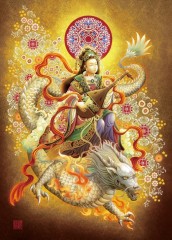Jigsaw puzzles from Japan
Gods: seven, four, and more
On this page: The seven gods - The four gods - Other deities
The seven gods
The Seven Lucky Gods (Shichi-fuku-jin) are an assemblage of deities from all across Asia, who are invariably seen as bringers of wordly wealth, most typically in their "treasure boat".
Mark Schumacher again has a detailed page on the Seven gods.
No puzzles currently available
The four gods
In Chinese mythology these four gods occupy the four corners of the cosmos: the white tiger in the west, the blue dragon in the east, the red phoenix (Suzaku) in the south, and the mysterious Genbu in the north. Mysterious, because Genbu apparently turns up as a snake and a turtle entwined together, which is why the four gods have five heads. These deities are associated with feng shui, and have also appeared in Japanese animations, so they are easy to find on the Web.
Mark Schumacher has lots more details on his page on Ssu Ling (the Chinese name).
No puzzles currently available
Other deities
Benzaiten, or Benten
Benzaiten traces her history back to the Hindu goddess Saraswati, and is said to be responsible for everything that flows, which includes water obviously, but also music, eloquence, and thus knowledge. She is a member of the seven lucky gods group above, but often appears on her own. In fact, whole shrines are dedicated to her.
 © Miki Okuda 500: Benzaiten rides the dragon (Okuda)Benzaiten rides a classic Japanese dragon, which may be flying through the sky; but she calmly remains balanced enough to carry on playing the biwa (lute). A young artist from Tokyo, she describes herself as wanting to produce fantastic images...  In stock In stockAn Epoch puzzle: 500 pieces; 380 x 530 mm (15" x 21") Code: E06106 (06-106 on package) Retail price ¥2000 (approx. US$13.79 €12.74 £10.70) All about ordering (please read first)
|
The gods of wind and thunder
These two are generally depicted together, generating their respective natural forces: Fujin makes the wind with his big bag, and Raijin (or Raiden) makes thunder by banging his drums. Mark Schumacher has some more details in his page on the eclectic grouping of the 28 guardians.
No puzzles currently available
Deleted puzzles
For reference: you can view all the puzzles from this page that are out of print, in the Attic.

